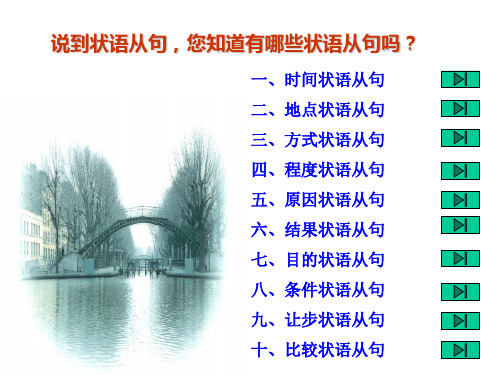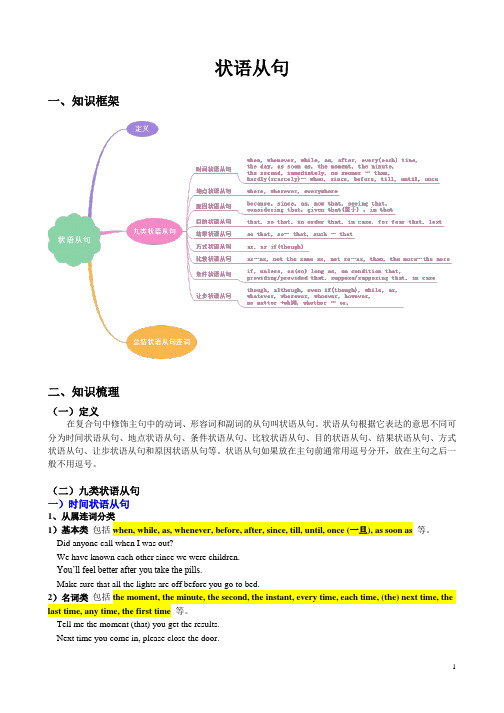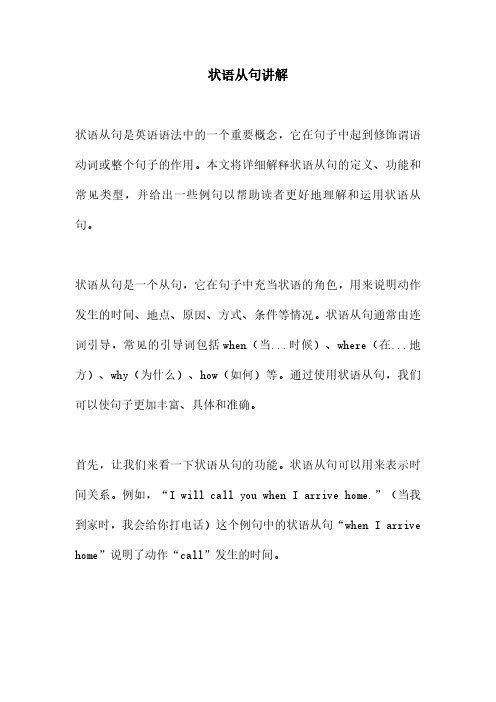状 语 从 句 详 解
初中英语状语从句详细解析

初中英语状语从句详细解析 状语从句是英语语法中的常⽤句型语法,那么⼤家是否清楚什么是状语从句呢?下⾯就是⼩编给⼤家带来的初中英语状语从句详细解析,希望能帮助到⼤家! 状语从句详细解析 ⼀、什么是状语、状语从句? 状语:是⽤来修饰动词、形容词、副词或全句⽤的。
eg:He works hard! (他努⼒⼯作)中的hard。
状语的位置: 修饰形容词或副词的状语放在被修饰语之前。
eg:The Summer Palace is very beautiful.颐和园⾮常美丽。
(very 为状语,修饰形容词 beautiful,放在 beautiful 之前)。
修饰动词的状语有的放在动词前,有的放在动词之后。
如果动词有宾语,状语⼀般须放在宾语之后。
eg: I He often came here to see me.他经常到这⾥来看我。
(often 为状语,修饰动词came,放在前⾯)。
I know him well.我⼗分了解他。
(well为状语,修饰动词 know,放在 know 之后)。
状语从句:⽤⼀个(从句)来作另⼀个句⼦(主句)的状语,⽤作状语的句⼦就叫作状语从句。
作什么样的状语就叫什么类型的状语从句。
例如:条件状语从句就是⽤⼀个句⼦来作条件状语。
⼆、状语从句的分类。
(1)时间状语从句 凡是从句都必须有引导词,引导时间状语从句的词有when,before,after,until,as soon as,while 等,具体⽤法如下: 1. when 意为“当……时”,引导时间状语从句,表⽰主句的动作和从句的动作同时或先后发⽣。
eg: I feel very happy when you come to see me. When you are crossing the street,you must be careful. when引导的时间状语从句,when的从句可以⽤延续性动词,也可以⽤瞬间动词。
英语状语从句要点难点详解

1.引导原因状语从句最常用的连词是 because, since, 和as, 所引导的从句可以放在主句之前,也可放在主句之后。其 中 because语势最强,since次之,as又次之。
△ because通常表示说话人认为这种理由或原因是听话人所不知道
HSceahrcaedlyimhapdrehseseednmtereetdhatht ewraoyotmhewfhiresnt tihmeepIhomneetrhainmg..
I started the very moment I got your letter. I’ll tell him the minute (that) he gets here.
TEhveryyhtaimd ehaIrcdaltychstarctoedldt,oI whaovrek pwahineninthmeytrboaucbkl.e began. IH’armdlgyohinagd ttohesyeesthairmtendetxot wtimorekhwehceonmtehsettoroSuhbelnezbhegna. n. He lheafdt EscuarrocpeelytheentyeeraerdWthoerrldooWmawr Ⅱhenbrtohkeepohuotn. e rang.
3.某些表示时间的名词词组,如 the (very) moment (= as soon as ), t4h.e 有m些inu关te联(=从a属s 连soo词n,as如), nthoe sionosntaenrt…(= tahsasnoo/nhaasrd),lyth…e dwayh,etnhe/ ysceaarrc, etlhye…mowrhneinng/,beavreerlyy …timweh, eenach等t,im也e, 能ne引xt导tim时e间, t状he语fi从rst句ti。me等, 也△可以如引果导把时no间s状oo语ne从r, 句ha,rd如ly,:scarcely, barely置于句首,它所连带 的I’这l部l t分ell就yo要u 倒ab装ou,t i如t th:e moment you come. IShsteahrtaeddnthoesoinosntearnht eIahredatrhdetnheewresptohratn. she fainted. TNhoesoinosntearnthsahdesshaewhheaimrdsthheeknneewws htheawnasshheefraibnrtoetdh.er.
高中英语状语从句详解及习题精练附答案

状语从句一、知识框架二、知识梳理(一)定义在复合句中修饰主句中的动词、形容词和副词的从句叫状语从句。
状语从句根据它表达的意思不同可分为时间状语从句、地点状语从句、条件状语从句、比较状语从句、目的状语从句、结果状语从句、方式状语从句、让步状语从句和原因状语从句等。
状语从句如果放在主句前通常用逗号分开,放在主句之后一般不用逗号。
(二)九类状语从句一)时间状语从句1、从属连词分类1)基本类包括when, while, as, whenever, before, after, since, till, until, once (一旦), as soon as等。
Did anyone call when I was out?We have known each other since we were children.You’ll feel better after you take the pills.Make sure that all the lights are off before you go to bed.2)名词类包括the moment, the minute, the second, the instant, every time, each time, (the) next time, the last time, any time, the first time等。
Tell me the moment (that) you get the results.Next time you come in, please close the door.He felt nervous each time she spoke to him.The last time we talked he said he needed another two days.3)副词类如immediately, directly, instantly, presently等。
(英语)初中英语状语从句试题经典及解析

合句意,可知前后句意是让步关系,故选 C。
10. --- What was the party like?
--- Wonderful. It ’ s years ____ I enjoyed myself so much.
A. since
B. after
C. when
D. before
【答案】 A
【解析】
据,且这个理由很重要,所以人们认为他没有犯抢劫罪,故选
C
13. —Mom, may I see the movie The Wandering Earth this weekend? I don't want to miss it.
—Sure, if your homework___.
A. is finished
A. until
B. although
C. so that
D. as soon as
【答案】 C
【解析】
【详解】
句意: Smith 夫人清楚地解释了这个问题,以至于我们所有人都能明白她。
until 直到 …时
候; although 尽管,虽然; so that 以至于,为的是; as soon as 一…就 …。根据句意可知,
引导的让步状语从句。根据题意,故选 A。
15. The environment will be much worse ___________ everyone has a sense of protecting it.
A. unless
B. if
C. so that
【答案】 A
【解析】
【详解】
句意:除非每个人都有保护环境的意识,否则环境会更糟。考查连词辨析。
高中英语状语从句详解表格例句

状语从句状语是用来修饰动、形、副词的句子成分。
由副词,介词短语,分词,分词短语,不定式,从句来充当。
可以表示地点,时间(伴随),原因,目的,结果,条件,让步,程度,方式,比较。
位置可在句首、中、末。
状语从句---------●时间状语从句:when, while, as, before, after, since, till, until, by the time, as soon as,once,immediately, directly, instantly, the moment, the minute, the time, the day, each time, every time, any time, on doing sth, on one’s+ noun., no sooner…than, hardly…when, scarcely…when,●地点状语从句:where, wherever,●原因状语从句:because, since, as, now(that), seeing that, considering that, in that, for, ●目的状语从句:so, so that, in order that, in case, for fear that, lest●结果状语从句:so, so…that…, such…that…●条件状语从句:if, unless, as long as, so long as, in case, if only●方式状语从句:as, (just) as…so, as if / as though●让步状语从句:though, although, as, even if, even though, whether, while, whoever,whatever, whichever, whenever, wherever, however, no matter who/ what/ which/ when/ where/ how,。
状语从句讲解

状语从句讲解状语从句是英语语法中的一个重要概念,它在句子中起到修饰谓语动词或整个句子的作用。
本文将详细解释状语从句的定义、功能和常见类型,并给出一些例句以帮助读者更好地理解和运用状语从句。
状语从句是一个从句,它在句子中充当状语的角色,用来说明动作发生的时间、地点、原因、方式、条件等情况。
状语从句通常由连词引导,常见的引导词包括when(当...时候)、where(在...地方)、why(为什么)、how(如何)等。
通过使用状语从句,我们可以使句子更加丰富、具体和准确。
首先,让我们来看一下状语从句的功能。
状语从句可以用来表示时间关系。
例如,“I will call you when I arrive home.”(当我到家时,我会给你打电话)这个例句中的状语从句“when I arrive home”说明了动作“call”发生的时间。
其次,状语从句可以表示地点关系。
例如,“She looked around to see where the noise was coming from.”(她四处看看,想知道声音是从哪里传来的)这个例句中的状语从句“where the noise was coming from”说明了动作“look around”的地点。
此外,状语从句还可以表示原因、条件和方式等关系。
例如,“He couldn't go to the party because he was sick.”(他因为生病所以不能去参加聚会)这个例句中的状语从句“because he was sick”表示了动作“couldn't go”的原因。
在使用状语从句时,需要注意一些语法规则。
首先,状语从句通常放在主句之前或之后,具体位置取决于需要强调的内容。
其次,状语从句的谓语动词通常使用一般现在时,而不受主句的时态影响。
例如,“I will call you when I arrive home.”(当我到家时,我会给你打电话)中的“arrive”使用的是一般现在时。
冲刺高考英语专题训练:专题10 状语从句 (解析版)
专题10 状语从句距离高考还有一段时间,不少有经验的老师都会提醒考生,愈是临近高考,能否咬紧牙关、学会自我调节,态度是否主动积极,安排是否科学合理,能不能保持良好的心态、以饱满的情绪迎接挑战,其效果往往大不一样。
以下是本人从事10多年教学经验总结出的以下学习资料,希望可以帮助大家提高答题的正确率,希望对你有所帮助,有志者事竟成!养成良好的答题习惯,是决定高考英语成败的决定性因素之一。
做题前,要认真阅读题目要求、题干和选项,并对答案内容作出合理预测;答题时,切忌跟着感觉走,最好按照题目序号来做,不会的或存在疑问的,要做好标记,要善于发现,找到题目的题眼所在,规范答题,书写工整;答题完毕时,要认真检查,查漏补缺,纠正错误。
总之,在最后的复习阶段,学生们不要加大练习量。
在这个时候,学生要尽快找到适合自己的答题方式,最重要的是以平常心去面对考试。
英语最后的复习要树立信心,考试的时候遇到难题要想“别人也难”,遇到容易的则要想“细心审题”。
越到最后,考生越要回归基础,单词最好再梳理一遍,这样有利于提高阅读理解的效率。
另附高考复习方法和考前30天冲刺复习方法。
1.(2021全国乙卷)Ecotourism has its origin with the environmental movement of the 1970s. It was not widely accepted as a travel concept __________ the late 1980s.1.until【解析】考查状语从句。
句意:直到20世纪80年代晚期才作为旅游观念被广泛接受。
根据句意可知,此处表示“直到20世纪80年代晚期才作为旅游观念被广泛接受”,表示“直到……才……”使用固定句型“not……until……”。
故填until。
2.(2021天津卷)We all need to get involved in saving energy ________ it's at work, at home, or at school.2.whether【解析】考查状语从句。
状语从句 大集合 详解加例句 一目了然
You look great since you've been taking those exercise classes. We had already left by the time they arrive. We will have already left by the time they arrive.
It was not until he saw his mother that the little boy smiled.
I did't go to bed until 12 o'clock last night.
时间 状语 从句
not/否定意义的单词 + 短暂动词 + until(介词) + 表示时间点的名词短语 (句型变化同上)
It took a few months of investigation before it became clear.
after
I moved to America after I had learned English for ten years. It has been three years since I came to China. It has been three years since I have come to China It's been three years since I worked in this company. 离开三年了 It's been three years since I have worked in this company. 工作三年了
时间状语从句
主句一般过去时+从句一般过去时 at that time: 短暂动作时 使用一般过去时态 主句一般过去时+从句过去完成时 主句过去完成时+从句一般过去时 主句一般过去时+从句过去进行时 during that time,延续动 主句过去进行时+从句一般过去时 作使用过去进行时 (可在从句中加suddenly一词) when 主句一般将来时+从句一般现在时(从句用一般现在时表将来) 表示从句 主句一般将来时+从句现在完成时 动作先发 (从句用现在完成时表一个将要发生的动作,为了强调,在从句 生 表达时间 动作结束了之后,主句动作才开始发生,此时从句动作一般都是 是将来 要持续一段时间的) 表示主句 先发生 表示时间 是现在 whenever while 主句将来完成时+从句一般现在时 主句将来进行时+从句一般现在时, 主从句都用一般现在时,表示一般动作的when引导的从句往往是 说明一般情况,阐明一个道理,常出现在名言警句,或格言中。 表示“无论如何”,相当于when的强调形式 during that time,从句的谓语动词通常是延续动词 还有另外三个意思:表示条件的“只要”,表示对比的“然而”,表示让步的“尽管 ” 延续动词 延续动词+until(连词)+从句的短暂动词 延续动词+until(介词)+ 表示时间点的名词短语 Smile whenever you pick up the phone, for the caller will be able to notice it. The doorbell rang while we all watching TV. Until I came back, he was waiting for me at my home. I will be away from my office until next Tuesday. 都表达从句动作先发生, I started my dinner when he left. 意义相差不大,句型可转 I started my dinner when he had left. 换 若要表示主句动作先发 I had started my dinner when he 生,则主句使用过去完成 left. 时。 The doorbell rang when I was telephoning . I was telephoning when the bell rang. I'll tell him about it when he comes back. The winner will be declared when every competitor has finished the course. The performer will already have played the music when we get there. The performer will be playing the music when we get there.
九种状语从句详解以及专项练习
状语从句能力要求:了解状语从句的分类情况及各类状语从句中经常使用的连词;能够在真实的语境中断定从句与主句的逻辑关系,从而使用恰当的连词完成交际;能够辨别同类状语从句中近似连词的用法差异。
一、时间状语从句1. when, while 和as1) when 既可引导一个持续动作,也可引导一个短暂动作,可用于主句动作和从句动作同时发生或从句动作先于主句动作:When I lived there, I used to go to the seashore on Sundays.When the film ended, the people went back.当when 引出的时间状语从句为系表结构,而且其主语和主句的主语一致,其表语又是一个名词时,就可以那个以as引出的省略句,来代替when引导的从句:As a young man ( = when he was a young man ), he was fond of hunting.2) while 引导的动作必须是持续性的,侧重主句动作和从句动作相对比:Please don’t ta lk so loud while others are working.While I was wondering at this, our schoolmaster took his place.3) as 引导一个持续动作,多用于主句动作和从句动作同时发生:He hurried home, looking behind as he went.John sings as he works.4) when 还可用作并列连词,其意义为at this / that time, 常用于下列句式:be doing sth. when … / be about to do sth. when … / had ( just ) sth. when …此外,when 还可表示原因“既然”:It was foolish of you to take a taxi when you could easily walk there in five minutes.How can you hope for mercy yourself when you show none?5) while作为并列连词,意为“而,却”,表示对比:Mom was cooking in the kitchen while dad was watching TV in the sitting room.He likes pop music while I am fond of folk music.6) 如果主句表示的是短暂动作,而从句用延续性动词的进行时态表示在一段时间内正在进行的动作时,when 、while和as可以互相换用:When / While / As I was walking down the street, I came across an old friend of mine.while必须与延续性动词连用;强调主句动作延续到从句所指的整个时间时,只能用while;表示“随着”只能用as;表示有规律的“每当”时或主从句动作有先后时,只能用when.The plane had left when we got to the airport. ( 不用while)As time passed, the event became more and more popular. (不用while或when )When winter comes, it becomes cold. ( 每当,不用as 或while )When you have finished your work, you may have a rest. ( 不用while 或as )2. as soon as, immediately, directly, the moment, the minute, the second, once ( 一旦…就…) no sooner … than…, hardly / scarcely … when …这些从属连词引导的从句都表示从句的动作一发生,主句的动作随即就发生,常译为“一…就…”. 从句中用一般时态代替将来时态:The moment I heard the voice, I knew father was coming.The boy burst into tears immediately he saw his mother.Once you remember it, you will never forget it.No sooner had we arrived at the station than the train left.最后三个句式中,no sooner与hardly / scarcely 引导的主句谓语动词要用过去完成时,而than 与when的从句中要用一般过去时,此外,当把no sooner与hardly / scarcely提到句首时,应用倒装语序:I had hardly got home when it began to rain. = Hardly had I got home when it began to rain. On + v-ing ( hearing, seeing, returning等) 或n.( arrival, return等) 也等于as soon as.3. till, until 和not … until1) 肯定句:主句谓语动词必须是延续性动词,主句、从句都为肯定式,意为“某动作一直延续到某点时间才停止”:He remained there until / till she arrived.You may stay here until the rain stops.2) 否定句:主句谓语动词必须是非延续性动词,从句肯定式,意为“某动作知道某时间才开始”。
(英语)中考英语状语从句解析版汇编及解析
书。 when ,当 ……的时候; if 如果; after 在……之后; unless,如果不,除非。结合句意,
故选 D。 考点:考查连词的用法。
5._____ the weather is fine tomorrow, we will go fishing.
A. As well as 【答案】 C
B. As soon as
C. As long as
D. As far as
【解析】
【详解】
C 本题考查连词短语用法。句意:只要明天天气好,我们就要去钓鱼。
A. As well as 也; B.
As soon as 意为:一 ……就; C. As long as只要; D. As far as 意为:和 ……一样远。引导条件状 语从句用 as long as 只要。故选 C。
A.
如果; B.除非; C.直到; D.当 ……时候。答语是条件状语从句,根据句意结构可知,需要
unless 连接,故选 B。
7.__________ you have tried it on, you can
A. Because
B. Although
【答案】 C
【解析】
’ t imagine how pretty the new style skirt is.
A. arrives
B. arrived
C. is arriving
【答案】 A
D. will arrive
【解析】
【详解】
句意:亨利一到,他就要给我们做一个报告。当主句描述将来动作时,英语条件状语从句
中用一般现在时态表示将来的动作;主语单三,谓语动词用单数形式;故选
A。
- 1、下载文档前请自行甄别文档内容的完整性,平台不提供额外的编辑、内容补充、找答案等附加服务。
- 2、"仅部分预览"的文档,不可在线预览部分如存在完整性等问题,可反馈申请退款(可完整预览的文档不适用该条件!)。
- 3、如文档侵犯您的权益,请联系客服反馈,我们会尽快为您处理(人工客服工作时间:9:00-18:30)。
注:
• ①though和although可以互换,只是 though和although可以互换,只是
although比较正式。 although比较正式。 • ②though不可以与连词but连用,但可以 though不可以与连词but连用,但可以 与yet,still连用,例: yet,still连用,例: • Though he worked hard, he couldn’t couldn’ pass the exam. • 虽然他很努力,但还是没通过考试。
例:
• I don’t know if he will come tomorrow. don’
(宾从) • 我不知道他明天是否来。 • If he comes, I’ll tell you.(I’ll tell you if I’ you.( he comes.) comes.) • 如果他来,我会告诉你。
2. 原因状语从句
• 原因状语从句通常由because, as, since等 原因状语从句通常由because, since等
词引导。 • because语气较强,用以回答why问句 because语气较强,用以回答why问句 • as语气较弱,较口语化,所表示的原因 as语气较弱,较口语化,所表示的原因 较明显。 • since语气较弱,常表对方已知的事实, since语气较弱,常表对方已知的事实, 相当于汉语的“既然” 相当于汉语的“既然”。
从上面的例子可以看出,状语从句的位 置比较灵活,有时可以放于句首,有时可 以置于句末。状语从句位于句首时,其后 常用逗号与后面的句子隔开。 状语从句可以根据其用途分为时间状 语从句、地点状语从句、原因状语从句、 结果状语从句、程度状语从句、目的状语 从句、条件状语从句、让步状语从句及方 式状语从句,今天我们主要来复习时间状 语从句、原因状语从句、结果状语从句、 目的状语从句、条件状语从句、让步状语 从句等。
5. 条件状语从句
• 条件状语从句表示条件,关联词常用if或unless, 条件状语从句表示条件,关联词常用if或
• • • • • •
as (so) long as. as. If it snows tomorrow, we will build a snowman. 明天如果下雪,我们就堆雪人。 You’ You’ll catch a cold unless you put on your coat. 你会感冒的除非你穿上大衣。 He will do anything as long as it is interesting. 只要有趣,他什么都愿意干。
注:1 注:1
•
①比较状语从句后面的主语在口语中常 用宾格。 • ②如果后面的句子主语为主格时,可以 加助动词、情态动词等。 • He can jump higher than I can. • 他能比我跳得高。 • He came later than LiLei did. • 他比李磊来得晚。
e.g.
• I eat potatoes because I like them. • 我吃土豆是因为我喜欢土豆。 • As I didn’t know the way, I asked a didn’
policeman. • 我由于不知道路,因而问警察。 • Since you won’t help me, I’ll ask won’ I’ someone else. • 你既然不帮我,那我就请别人帮我。
【模拟试题】(答题时间:50分钟) 模拟试题】(答题时间:50分钟)
• ( A )1. Did he tell you __________ at the • • • • •
school gate? A. who he waited for B. who is he waiting C. who did he wait for D. who he was waiting ( D )2. Do you know _______________? A. who is he B. what he is C. what is he D. who he is
( C )6. Do you know ___________ after school every day? A. what does he do B. he does what C. what he does D. does he do what ( B )7. Have you decided __________ with me? A. who will you go B. who will go C. who went D. who did you go ( C )8. He asked me ________________. A. who did kick the first goal in the Woeeting held C. when China became a member of the WTO D. where will the 2008 Olympic be held
4. 目的状语从句
• 目的状语从句常由so that, in order that等词引导, 目的状语从句常由so that等词引导, • • • •
目的状语从句常用助动词may(might) 目的状语从句常用助动词may(might), shall (should), will(would), can (could)。目的状 should) will(would) (could)。目的状 语从句常放于主句之后,例: Speak clearly so that they may understand you. 你要讲得清楚,他们才听得懂。 He spoke slowly in order that everyone should understand. 他讲得很慢以便人人能听懂。
6. 让步状语从句
• 让步状语从句,表示“虽然,尽管,即使”等概 让步状语从句,表示“虽然,尽管,即使” • • • • • •
念,常用的关联词有:though, 念,常用的关联词有:though, although, even though等。 though等。 Though he was ill, he was still working. 他虽然有病,但仍然继续工作。 Although it is difficult, we shall do it. 此事虽难,但我们还是要做。 Even though you say so, I do not believe it. 即使你这样说,我也不信。
3. 结果状语从句
• 结果状语从句常用so that, such that等关联词引 结果状语从句常用so that等关联词引 • • • • • • •
导。 e.g. He is so young that he can’t go to work. can’ 他如此小以致于他不能上班。 He got so little pay that his family had to live on welfare money. 他工资很少,他的家人不得不靠救济金生活。 It’s such a good chance that we mustn’t miss It’ mustn’ it. 机会这样好,我们决不能失掉。
( D )3. I don’t know ____________. A. where does he come from B. where he does come from C. where he come from D. where he comes from ( B )4. —Excuse me. Could you tell me _________ get to the plane? —Certainly. Go straight along here. A. how can we B. how we can C. where can we D. where we can ( A )5. The teacher asked the new student ____________ class he was in. A. which B. where C. how D. when
状语从句详解
状语从句
• 用作状语的从句叫做状语从句。引导状语从句的关联词 • • • • • • • • •
是一些从属连词。 例: When you cross the road, you must be careful. 当你过马路时要小心。(when是从属连词) 当你过马路时要小心。(when是从属连词) I was late because I missed the bus. 我迟到了,因为我误了公共汽车。(关联词是从属 连词because) 连词because). If she asks me, I’ll tell her. I’ 她如果问我,我就告诉她。(关联词是从属连词if) 她如果问我,我就告诉她。(关联词是从属连词if) You look as if you need a rest. 你像是需要休息似的。(关联词是从属连词as if) 你像是需要休息似的。(关联词是从属连词as if).
注:2 注:2
• ①because of和because的区别 of和because的区别 • because of后加名词代词或动名词,不加句子,而 of后加名词代词或动名词,不加句子,而 • • • • • • • • •
because加句子,例: because加句子,例: Because of his illness, he didn’t go to work. didn’ 因为生病,他没上班。 Because he was ill, he didn’t go to work. didn’ ②在条件和时间状语从句中,如果主句用将来时,从句 常用一般现在时。 If it doesn’t rain, we’ll go fishing. doesn’ we’ 明天不下雨我们就去钓鱼。 As soon as he comes back, I’ll let him know it. I’ 他一回来,我就让他知道这事。 ③if构成条件从句时意为“如果”,可以放句首也可以 if构成条件从句时意为“如果” 放主句后;构成宾语从句时意为“是否” 放主句后;构成宾语从句时意为“是否”,一般放主句后。
